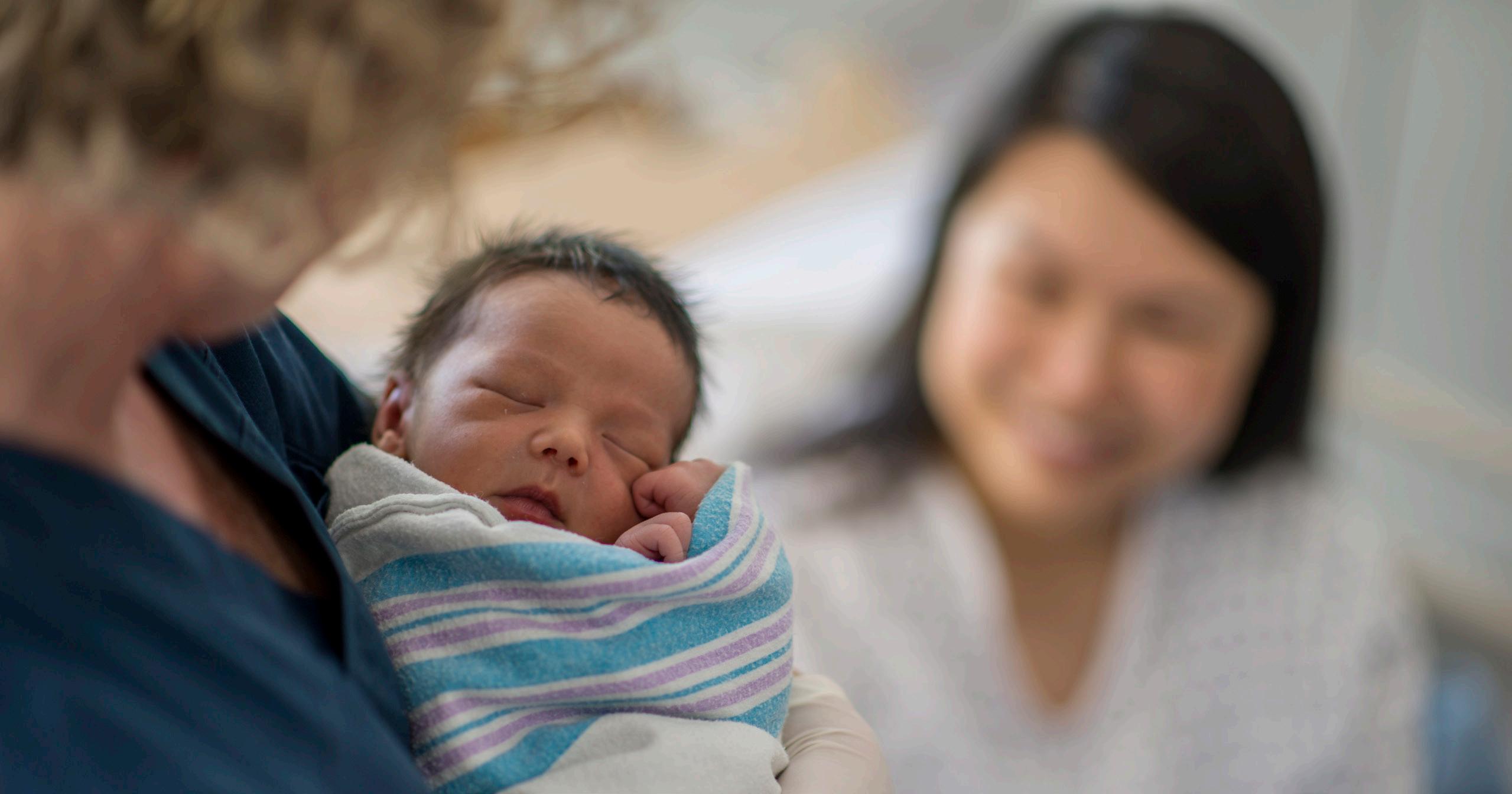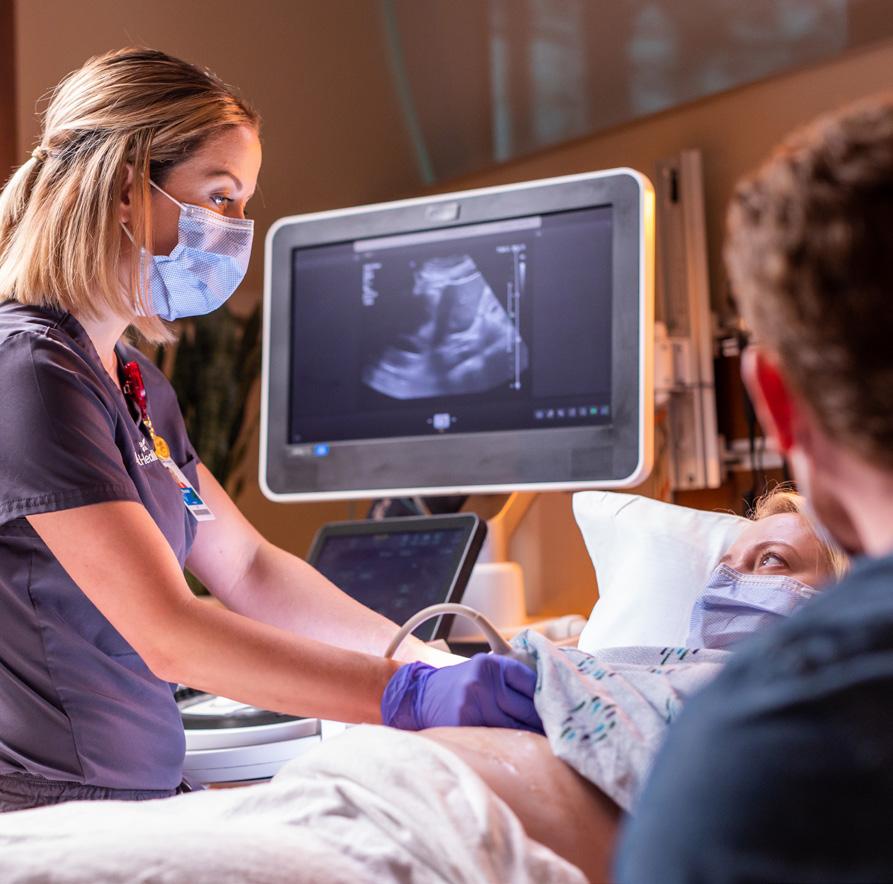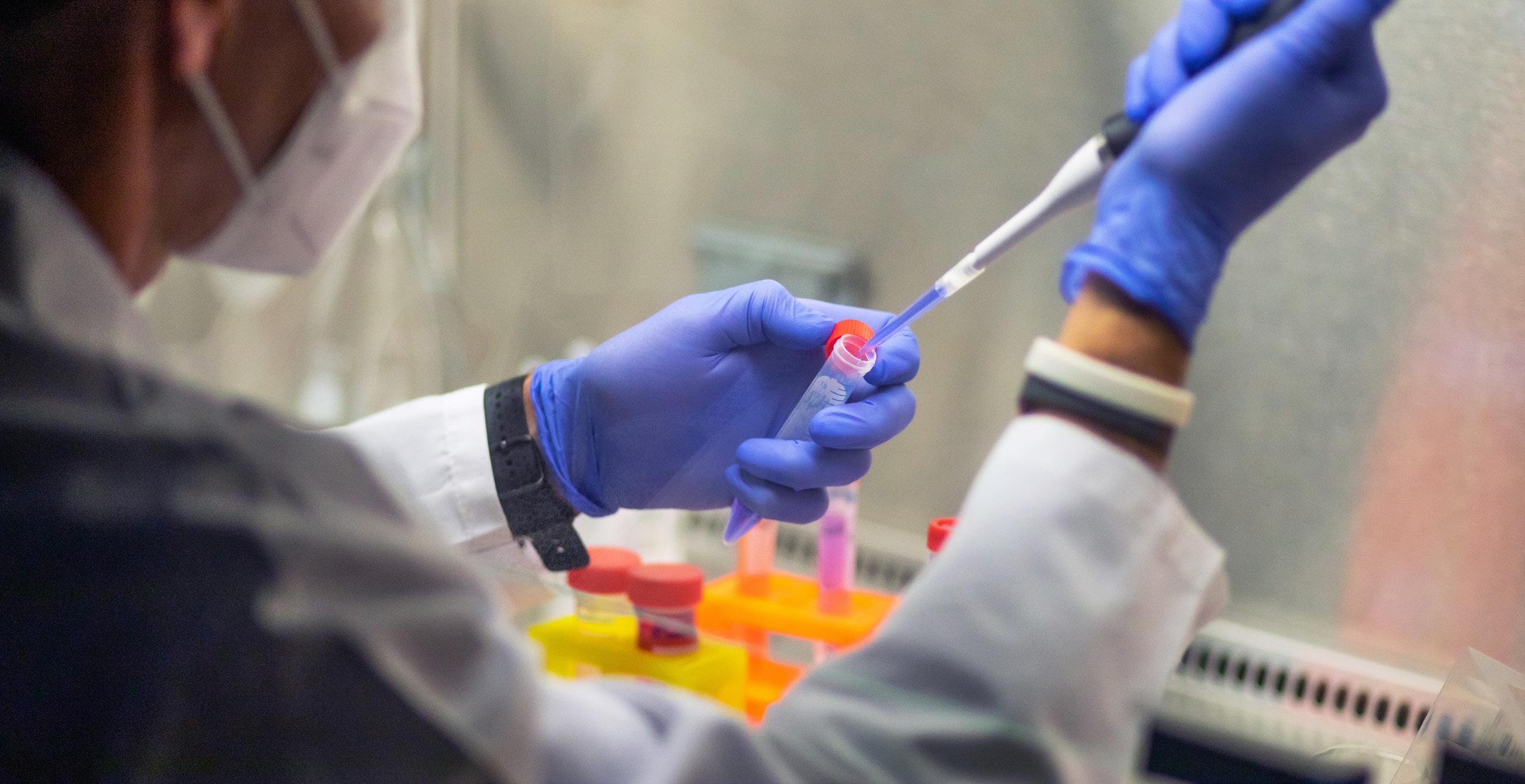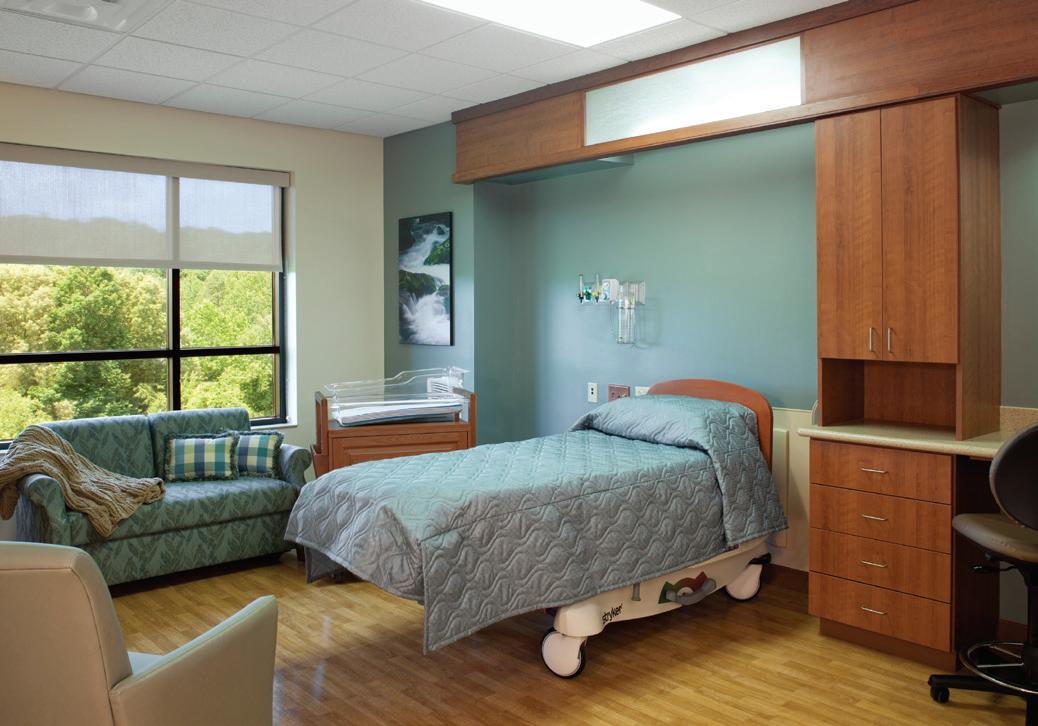New Patient Packet
AdventHealth Medical Group Obstetrics & Gynecology
Welcome to AdventHealth Medical Group Obstetrics & Gynecology. *
Thank you for choosing our team to support you in your obstetric care.
During your prenatal care, we work with you to develop a plan for your health and make sure your baby is developing well. Please review the information in this packet and reach out with questions.
Due to the nature of our practice, it may be necessary to reschedule your appointments to accommodate unexpected deliveries or surgical needs. We will do our best to limit the disruptions you may experience with your care. It is our desire to take the best care of you and your unborn baby.

*A hospital department of AdventHealth Hendersonville.
Our Providers
South Asheville
Kenneth W. Jackson, Jr., MD, FACOG

Board-certified in Obstetrics and Gynecology
Hendersonville
Eileen Keppler, MD, FACOG



Board-certified in Obstetrics and Gynecology
Justin Towle, M.D., FACOG

Mollie Tolan, CNM Certified Nurse Midwife
Candler
Kelly Thompson, FNP, CNM
Certified Nurse Midwife
Habla español
Board-certified in Obstetrics and Gynecology
Vicki Delestowicz, CNM Certified Nurse Midwife


Cynthia Noland, CNM, MSN
Certified Nurse Midwife

Prenatal Visits
Confirming Pregnancy Visit:
We will confirm and date your pregnancy using your period (if known) and ultrasound. Once set, your due date will remain the same throughout the pregnancy.
Nurse Intake Visit:
You will meet with one of our medical assistants to review your medical history, your obstetric packet and have labs ordered and drawn and confirm that you have had a dating ultrasound. You will be scheduled for your first OB visit with your doctor.
OB Visits:
12 weeks to 28 weeks (about 6 and a half months):
Your OB visits will occur every 4 weeks and will include a check of your weight and vital signs at every visit. Each visit will also include a urine check. If your urine has findings suggesting bladder or urinary tract infection, we will send your urine for culture and notify you if antibiotics are recommended.
28 weeks (about 6 and a half months) to 36 weeks (about 8 and a half months): Between 26 and 28 weeks of pregnancy, we will have you scheduled for a screen for gestational diabetes (known as Glucose Tolerance Test or GTT). You also will have state mandated Sexually Transmitted Disease (STD) (which includes HIV, syphilis and possibly gonorrhea/chlamydia testing). We will check your blood count at the time of your blood draw and make certain that you are not anemic. If you are, your provider may request that you start taking an iron supplement.
36 weeks (about 8 and a half months): We will see you weekly. At 36 weeks (about 8 and a half months) we will complete a pelvic swab called a Group B Strep Test to confirm if this bacterium is present. If you test positive for Group B bacteria, we will treat you with antibiotics during labor.
Ultrasound
Ultrasound is used for multiple indications to evaluate your pregnancy. Your provider may order an ultrasound for the following reasons:
• Evaluate for bleeding
• Confirm and determine your due date
• Evaluate placenta
• Evaluate the baby’s anatomy
• Confirm fetal position
• Evaluate amniotic fluid around the baby
• Help determine the size of the baby and evaluate growth
Your provider will discuss with you if ultrasounds are needed and if so, how often to evaluate your specific pregnancy and any complications.
An order from your provider is needed to complete the ultrasound.
Our ultrasound techs work closely with our providers. You may notice that your ultrasound tech does not discuss much information during your ultrasound, or they may even ask a provider to visualize your ultrasound in real time as some images are easier to see and evaluate in person. Your provider will review with you the results and findings of your ultrasound images.

Labs
Blood work and Urine tests during pregnancy
At your initial visit, your nurse or medical assistant will follow doctors’ orders checking multiple standard labs.
These labs may include:
• Blood type and antibody screen
• Blood count (CBC)
• Antibody testing to determine immunity Rubella, Chickenpox
• HIV (Human Immunodeficiency Virus) testing
• Hepatitis B testing
• Gonorrhea and Chlamydia screening
• Syphilis testing (RPR)
• Drug or illicit substance screening
• Urine culture to make certain no infection is present
• At 16 to 20 weeks your provider may recommend an AFP (alpha-fetoprotein test) to evaluate the risk of open neural tube defect such as: Cystic fibrosis, Spinal Muscular Atrophy, and hemoglobin electrophoresis: Especially if you have certain risk factors.
• Glucose screening
• Group B Strep test screening
*Your medical history may indicate that you need further testing.
Genetic Testing
1. NIPT (Non-Invasive Prenatal Testing):
This is a blood test from maternal blood that obtains fetal blood cells as they circulate in your blood stream. The fetal cells are evaluated to determine if there are genetic changes related to Trisomy (or extra chromosomes). This test evaluates for the presence of Trisomy 13, 18, and 21 (Down Syndrome). This test also looks at fetal sex chromosomes and therefore can determine gender. NOT all insurance plans cover this test and there may be an out-of-pocket charge.
2. Quad or sequential screening:
This blood test from maternal blood looks at protein markers that can be increased in women with babies who have genetic changes. If this test is abnormal, it does not diagnose a genetic problem but shows an increased risk for baby having a genetic condition and would lead to further testing or evaluation.
3. Cystic fibrosis, Spinal Muscular Atrophy and Fragile X carrier testing:
Your provider may recommend these tests to determine if you carry genes that increase risk of these conditions for your baby. This will only be recommended once in your lifetime, during your first pregnancy. If you do not carry these genes, then no further testing is needed.

The Last Weeks of Pregnancy (36 weeks and beyond )
You are now entering the final weeks of pregnancy and waiting for labor to begin. It is common to feel excited and a little anxious as you approach such an important day in your family life. We have dedicated doctors and nurses who will be with you in labor, birth, and during your initial postpartum period. In this packet, you will find some useful information for these last weeks of pregnancy.
GBS
Group B Streptococcus (GBS) is a type of bacteria that commonly lives in the gastrointestinal (GI) and genital tracts. About 25% of women test positive for GBS and are unaware of their carrier status because they have no symptoms.
At 36 weeks pregnant we will test you for GBS because there is a small risk of passing the bacteria to the baby during delivery. The test allows us to know if treatment is necessary.

If you test positive, we will treat you in labor with IV antibiotics to minimize or eliminate the risk of transmitting GBS to the baby. Ampicillin/PCN are the drugs of choice, but if you are allergic, other medications are available. A cesarean section is not recommended when a mom tests positive for GBS.
Signs that labor may be approaching:
• Mucus like discharge
• Increasing pressure in your pelvis
• Surge of energy/nesting
• Increase in Braxton Hicks contractions
When to go to the hospital:
Contractions:
Painful, 5 minutes apart for an hour straight. If you have a history of fast labor, if this is not your first baby, or if you feel like you cannot wait an hour, you should use your judgment and come in to be evaluated. You do not have to wait until your water breaks if you are having regular, painful contractions.
Your water breaks:
This can be a large gush of water that is all over the floor and running down your leg, a series of small gushes, or a trickle. If you are unsure, you can put on a pad and see if the pad becomes wet and needs to be changed. If you are still concerned, call the office or go to The Baby Place. Our team can perform a quick and easy Rupture of Membranes (ROM) test to determine if your water broke.
Vaginal bleeding:
Spotting or very light bleeding after a cervix check in the office is not uncommon. This is not concerning. Bleeding can also occur with cervical change in labor.
If you are having regular and strong contractions and you begin having some light bleeding, you should go to The Baby Place.
While it is unusual, if you have heavy bleeding it is a matter of concern. If you have heavy vaginal bleeding (like a very heavy period), that is not stopping, you should go to The Baby Place.
If you live far from the hospital, you may need to call 911.
Decreased fetal movement:
Remember the Fetal Kick Counts explained in the last packet.
Your baby should begin moving about 20 minutes after you eat a good meal or a generous snack and drink water or juice. You have 1 hour to get 5 movements or 2 hours to get 10 movements.
If you do not get the desired number of fetal movements, call and inform your OB provider or go to The Baby Place for further evaluation.
Your Stay at The Baby Place
Moms and babies stay in the same room, a best practice for bonding called “rooming-in.”
Our pediatricians and neonatal nurse practitioners will come to your room to see your baby.
Our nursery is only for babies who need more evaluation. Otherwise, babies do not stay in the nursery.
Postpartum recovery is generally 1 to 2 days after a vaginal birth and 2 to 3 days after a cesarean birth. This is a time to recover, bond, establish breastfeeding and address any concerns. Our nurses and care team will provide education and support in preparation for you to go home.
Breastfeeding
When your baby is born, we deliver the baby into your arms, placing them “skin-to-skin” with you. We do have to dry your baby, but we delay weighing, measuring, and initial examination. Our nurses will help you begin breastfeeding if that is your plan.
You will not have breast milk immediately after birth. Instead, you will have a pre-milk substance called colostrum. It is small in amount but very rich in antibodies and protein. Colostrum has amazing benefits for your baby. We call it, “liquid gold.” The mature milk will come in within a couple of days.
Many mothers worry that their baby is not getting enough to eat and that their baby is hungry. Remember that the baby’s little stomach is only about the size of a marble at birth.
All babies cry. That is how they communicate. All babies lose a little weight after birth, whether breastfed or bottle-fed.
It is important that your baby gets a good “latch” to prevent nipple soreness. This means getting a good portion of the nipple in the baby’s mouth when your baby begins nursing.
If your baby moves down onto the tip of the nipple, it can cause pain and cracks on your nipples. Let the nurses help you if you have any concerns.
The Baby Place holds the Baby-Friendly designation for its commitment to caring for breastfeeding mothers and their babies. Our nurses are specially trained to help mothers get started with breastfeeding. We also have a very experienced lactation consultant who can come to your room and help you with breastfeeding.
Birth Control
If you have not given any thought to birth control before now, you may want to start thinking about your options. We can certainly provide information to you in the office, discuss those options and answer any questions that you have about available methods.
Breastfeeding mothers should not use birth control methods containing estrogen. Estrogen can severely decrease milk supply and may even dry up the breast milk. The good news is there are other, non-estrogen birth control options available. We are here to help.
We are so excited for you and your family as you move toward your baby’s birth! You have been looking forward to holding your baby in your arms for a long time. We look forward to meeting you and your baby too, congratulations!

How to Reach our Office Team Members:
At your initial visit, your nurse or medical assistant will follow doctors’ orders checking multiple standard labs.
AdventHealth Medical Group
Obstetrics & Gynecology at Medical Office Building*
50 Hospital Drive, Suite 4A Hendersonville, NC 28792
828-650-8077
AdventHealth Medical Group
Multispecialty at South Asheville*
15 Skyland Inn Drive Arden, NC 28704 828-654-5005
AdventHealth Medical Group
Multispecialty at Candler*
1388 Sand Hill Road, Suite 1 Candler, NC 28715 828-365-7652
If you need to speak with the provider on-call, call 828-654-5005. Be prepared to leave a detailed message for your provider including your name, date of birth, usual provider, how many weeks pregnant you are and details about your concern.

If you do not receive a return call within 30 minutes, please call again. Remember your provider is on call for deliveries as well as phone calls and Emergency Department care. If you need immediate assistance, please go to The Baby Place at AdventHealth Hendersonville.
*A hospital department of AdventHealth Hendersonville
WARNING SIGNS
During pregnancy:
• Fever higher than 100.4°
• Chills with or without fever
• Severe nausea and or vomiting not relieved with medication
• Bright red bleeding from the vagina
• Change in vision
• Abdominal pain or cramps
• Sharp pain or burning sensation with urination
• Sudden gush or flow of liquid from vagina
• Difficulty breathing
• Sudden swelling of face or hands
• Falls, motor vehicle accidents or domestic violence (abuse)
Welcoming Your New Baby at The Baby Place
During your stay at The Baby Place, you’ll only need to focus on one thing: your little bundle of joy. You will be brought into one of our spacious family suites where The Baby Place team will help you get settled and prepare for the arrival of your baby. Our rooms are LDRP so moms can conveniently Labor, Deliver, Recover and Postpartum all in one room.
At The Baby Place, we’ve made it our business to think of all the small things that might help you have a more comforting labor and deliver experience, including:
• Private labor, delivery and recovery suites
• Beds built for bonding
• Certified lactation counselors to assist new breastfeeding mothers
• Wireless fetal monitors that allow you to get out of bed and move around your suite during labor
• Birthing balls, peanut balls and other laboring amenities
• Convenient and flexible visiting hours
• Flat-Screen TVs, cable, and free WiFi
• Pull-out couches for overnight guests
All of our LDRP suites are equipped with a night light sound machine, a comfortable robe for use while you are staying with us and a pair of bedroom slippers for you to use during your stay and take home.
Visiting Hours
Daily hospital visiting hours are 8 am to 8 pm.

Labor and Delivery patients may have 4 visitors at one time, including their support person. Once your baby has arrived, postpartum mothers may have 4 visitors at one time during normal visiting hours, 8 am to 8 pm.
If you require a C-Section, patients may have 1 support person with them UNLESS under general anesthesia, then the support person will stay in the patient’s room. Team Members will bring in the support person when they are allowed to join the patient.
Visitation hours are subject to change. Please visit AdventHealthNC.com to view the most up-to-date visitor information.
Arriving at the Hospital
Where to Park
Monday through Friday, 8 am to 5 pm
Your driver may pull to the front entrance of the hospital and utilize our free valet parking services.
Saturday and Sunday
Your driver may park at the emergency room entrance and accompany you inside before parking in one of our parking lots.
Where to Check In
Monday to Friday 7 am – 8 pm
Check-in at the main hospital lobby before coming to The Baby Place.
Saturday and Sunday or after 8 pm on Weekdays
Please check in with the emergency room clerk. You will then be taken to The Baby Place.
What to Bring
• Infant car seat
• Camera and/or cell phone
• Cell phone charger
• Loose, comfortable clothing and nightgown or pajamas for you
• An outfit for baby to go home in
• Toiletries such as shampoo, conditioner, deodorant, toothbrush, and toothpaste
• Snacks
The Baby Place is equipped with the newborn essentials that you will need during your stay like diapers and wipes. If you are in need of basic supplies to safely care for your baby at home, please let our team know during your stay.
The Baby Place Educational Experience
We offer a variety of childbirth education opportunities such as:

• Childbirth classes
• Newborn care classes
• The Baby Place tours
• Breastfeeding support services
Visit AdventHealthNC.com/Events to register and learn more.
Medications During Pregnancy and Breastfeeding

Nausea:
saltine crackers, multiple small meals daily with an increase in protein, Unisom (Doxylamine) ½ of 25 mg tablet and Pyridoxine (Vitamin B6) 50 mg together twice a day.
Hemorrhoids:
Anusol, Tuck pads, Preparation H, Ice Packs, Witch Hazel
Constipation:
Increase dietary fiber and fluid intake. Walking 30 minutes a day. Metamucil, Fiber-All or Fiber One, Milk of Magnesia, Colace (follow all package instructions)
Headache:
Regular or Extra Strength Tylenol, follow package instructions. Magnesium supplement daily, Cold compress applied to back of neck/forehead, massage. Lavender and mint oil used topically to affected area.
Diarrhea:
Increase fluids, Imodium AD, follow package instructions. BRAT diet (Bananas, Rice (white rice), Applesauce, Toast) Avoid spicy/gas producing foods.
Heartburn and Indigestion:
Tums, Maalox, Rolaids, Mylanta, elevate the head of the bed at night, small frequent meals, avoid spicy foods
Allergies:
Benadryl, Zyrtec, Claritin, follow package instructions
Cough: Robitussin plain or DM, Cough drops, follow package instructions.
Cold:
Elderberry syrup or gummy, Tylenol Cold, DayQuil, follow package instructions. Rest, Fluids, Chicken soup
Sore Throat: Chloraseptic spray or lozenges, Cepacol or Cepastat, cough drops Warm saltwater gargles, several times a day
Nasal Congestion: Saline nasal spray, follow package instructions. Increase fluid intake, use room humidifier, elevate head of bed while sleeping.
Yeast infection: Monistat 3-day or 7-day
Leg Cramps: Tums, increase rest and fluid intake, calf stretches, over-the-counter magnesium supplement
Sour Stomach: Mylanta
Food and Drink During P regnancy:
Avoid:
• BloRaw/ Uncooked Meats
• Raw Fish
• Unpasteurized Cheeses
• Cold Deli Meat
• Alcohol
• Tobacco
• Soda/Pop
• Coffee (Limit!)
Enjoy:
• Fruits, vegetables and meats that are cooked
• Fully cooked salmon/ tuna
• Pasteurized cheeses
• Heated Deli Meat
• Sparkling water, water, milk, juice
• Chewing gum
• Limit yourself to one soft drink/soda a day
• Coffee – limit to 2 cups daily!
Urine or Blood Drug Testing
I Agree/ Disagree to random Drug Screening as deemed medically necessary by my physician.
I understand that a drug test is taken at the beginning of pregnancy and that this may be repeated later in pregnancy if indicated.
Patient Printed Name:
Patient Signature:
Date:
Witness:
Date:

















